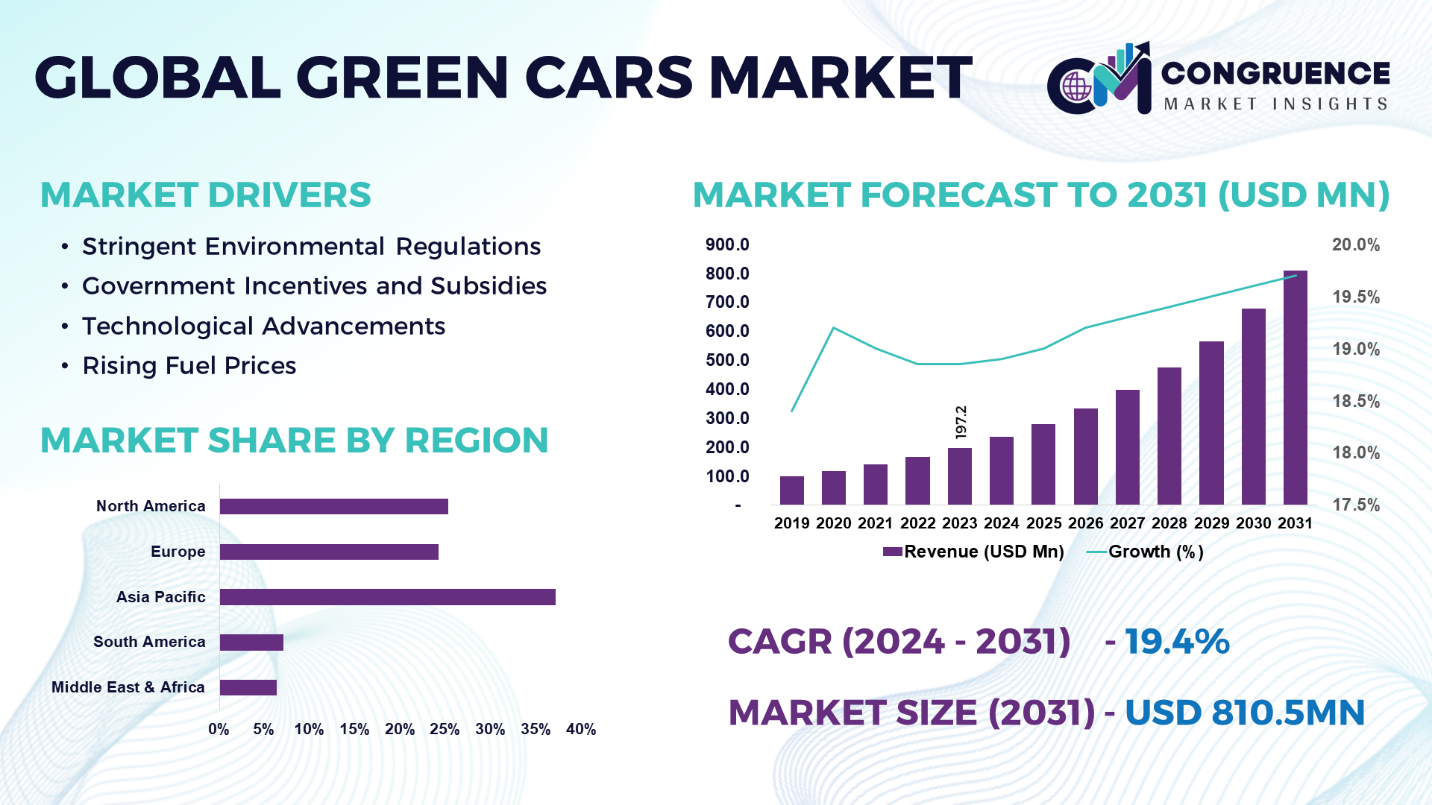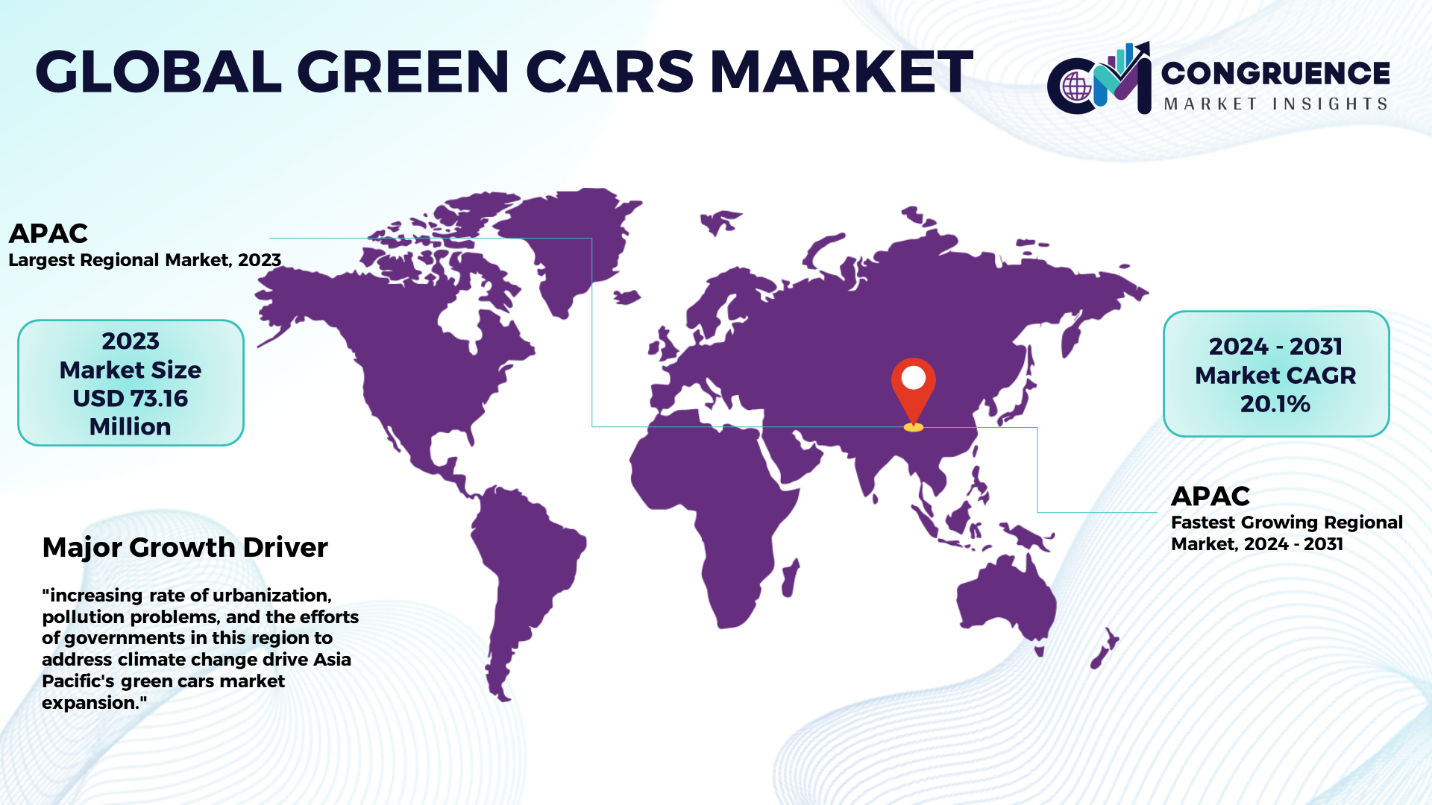Reports
The Global Green Cars Market was valued at USD 197.2 Million in 2023 and is anticipated to reach a value of USD 810.5 Million by 2031 expanding at a CAGR of 19.4% between 2024 and 2031.
Green cars, which dominate electric vehicles (EVs), hybrid electric vehicles (HEVs), plug-in hybrid vehicles (PHEVs), and fuel cell vehicles (FCVs), cause zero emissions and low carbon emission technologies that reduce dependence on oil in light of its quest to find alternative sources of energy. Nowadays, an impetus for this segment comes from the development of battery and fuel stack technologies, improvements on the governmental side through grants and tax benefits, as well as an increase in ecological literacy among people. Market transformation is observed nowadays due to the prominent role in emission control played by EVs, which benefit from considerable investments in charging infrastructure, extended driving range, and decreasing costs of lithium-ion batteries. Apart from that, hybrid and plug-in electric vehicles can provide a temporary solution that combines conventional engines with an electric propulsion system for improved fuel efficiency as well as reduced waste products entering the atmosphere. FCVs, although they are currently a small number, represent a potential future zero-emission technology suitable mainly for heavy-duty truck applications.

To learn more about this report, request a free sample copy
Green Cars Market Major Driving Forces
Stringent Environmental Regulations: Governments across the globe are focusing on the enforcement of strict emission standards and regulations to minimize CO2 emissions, thereby promoting the use of green cars among consumers and automobile manufacturers.
Government Incentives and Subsidies: Taxes, rebates, and subsidies offered to buyers of green cars also provide financial relief to consumers and increase the market demand for green vehicles.
Technological Advancements: Technological advancements in battery systems, fuel cells, and electric drive trains' efficiency, range, and cost effectiveness have stepped up the use of green cars as a sustainable option for conventional cars.
Rising Fuel Prices: The fluctuations of petrol and diesel prices and the general tendency of their rise are critical factors that make electric and hybrid cars more advantageous to consumers who want to spend less on fuel costs and use less petroleum products.
Green Cars Market Key Opportunities
Development of Charging Infrastructure: Investment in charging infrastructure development, such as fast charging and wireless charging technologies, provides businesses and the government with a means of supporting the uptake of electric vehicles.
Technological Innovation: Technological innovation in batteries, lightweighting materials, enhanced drivetrain efficiency, and other elements presents the possibility for manufacturers to create larger, more affordable EVs with greater ranges and quicker charging times.
Integration with Renewable Energy: The integration of green cars with renewable energy sources such as solar and wind power therefore offers the potential for further reducing carbon emissions and the development of a more sustainable automobile system.
Green Cars Market Key Trends
· In metropolitan areas, the use of electric cars (EVS) is growing.
· Expansion of networks supporting charging infrastructure globally.
· Technological developments improving the performance and range of EVS.
· Hybrid electric vehicles (HEVS) are becoming more and more common as stopgap measures.
· EV charging integration with renewable energy sources.
· The rise of cutting-edge transportation options like ride-hailing and car-sharing.
· Expansion of efforts to electrify business fleets.
· Green car demand is being driven by government subsidies.
· Raising consumer knowledge and awareness of environmentally friendly transportation.
· Cooperation between energy suppliers and automakers to create sustainable mobility solutions.
Region-wise Market Insights
Asia Pacific accounted for the largest market share at 37.1% in 2023 whereas, it is also expected to register the fastest growth, expanding at a CAGR of 20.1% between 2024 and 2031.

To learn more about this report, request a free sample copy
In North America, especially the United States and Canada, the Green Cars market is stimulated by the increasing emission standards, promotional measures, and consumers’ concerns towards environmental conservation. The region has a high charging infrastructure development and supports policies for EVs which made them popular in the region, particularly in the cities. Europe is another prominent region where Norway, Netherlands, and Germany are in the leading position in the use of electric vehicles. Strengthening policies and measures, favorable support schemes, and a vision of achieving carbon neutrality have supported the development of green cars in the region. In addition, more and more European automakers are now focusing on electric vehicle technology, and therefore there are more choices of EVs in the market and advanced battery and charging technology. The green cars market in Asia-Pacific is benefiting from the increasing rate of urbanization, pollution problems, and the efforts of governments in this region to address climate change. This is mainly attributed to the world’s largest automotive market especially China that is pushing for EV adoption through subsidies, incentives and supportive policies thus being a key driver of market growth in the region. Also, countries such as Japan and South Korea have focused on the battery technology and are also investing heavily in the infrastructure for electric mobility.
Market Competition Landscape
The green car market is very competitive and involves a number of various companies, from traditional car makers to new entrants and technology firms. The current leaders of the automotive market include Tesla Motors, Toyota, Nissan, and Volkswagen, which have a vast selection of electric and hybrid vehicles, backed up by significant R&D spending and global production capabilities. These key players are not idle and are constantly improving battery technology, improving the driving range, and lowering costs in a bid to remain relevant in the market. New market entrants or startup companies, especially those operating in the electric vehicle industry, are introducing new designs, better features, and affordable prices to the market. Others are Rivian, Lucid Motors, and NIO, which are drawing attention to their electric vehicle-based strategies to capture specific niches in the market and tap into the environmentally sensitive consumer. In addition, players like Apple and Google are expanding into the automotive sector and using their strengths in software and connectivity to create self-driving and electric vehicles. Prominent players in the market include:
· Tesla, Inc.
· Toyota Motor Corporation
· Nissan Motor Corporation
· Volkswagen Group
· Rivian Automotive, Inc.
· Lucid Motors Inc.
· NIO Inc.
· BMW AG
· BYD Company Limited
· Ford Motor Company
· General Motors Company
· Hyundai Motor Company
· Kia Corporation
· Audi AG
· Honda Motor Co., Ltd.
|
Report Attribute/Metric |
Details |
|
Market Revenue in 2023 |
USD 197.2 Million |
|
Market Revenue in 2031 |
USD 810.5 Million |
|
CAGR (2024 – 2031) |
19.4% |
|
Base Year |
2023 |
|
Forecast Period |
2024 – 2031 |
|
Historical Data |
2019 to 2023 |
|
Forecast Unit |
Value (US$ Mn) |
|
Key Report Deliverable |
Revenue Forecast, Growth Trends, Market Dynamics, Segmental Overview, Regional and Country-wise Analysis, Competition Landscape |
|
Segments Covered |
· By Vehicle Type (Electric Vehicles (EVs), Hybrid Electric Vehicles (HEVs), Plug-in Hybrid Electric Vehicles (PHEVs), Fuel Cell Vehicles (FCVs)) · By End-user (Individual Consumers, Fleet Operators, Rental Companies) · By Battery Type (Lithium-ion, Nickel-metal Hydride, Solid-state) · By Charging Infrastructure (Home Charging, Public Charging Stations, Workplace Charging) |
|
Geographies Covered |
North America: U.S., Canada and Mexico Europe: Germany, France, U.K., Italy, Spain, and Rest of Europe Asia Pacific: China, India, Japan, South Korea, Southeast Asia, and Rest of Asia Pacific South America: Brazil, Argentina, and Rest of Latin America Middle East & Africa: GCC Countries, South Africa, and Rest of Middle East & Africa |
|
Key Players Analyzed |
Tesla, Inc., Toyota Motor Corporation, Nissan Motor Corporation, Volkswagen Group, Rivian Automotive, Inc., Lucid Motors Inc., NIO Inc., BMW AG, BYD Company Limited, Ford Motor Company, General Motors Company, Hyundai Motor Company, Kia Corporation, Audi AG, Honda Motor Co., Ltd. |
|
Customization & Pricing |
Available on Request (10% Customization is Free) |
